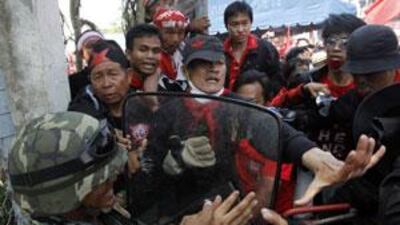BANGKOK // Thai anti-government protesters stormed into a telecom company compound, where authorities had shut down their vital TV channel, as soldiers and riot police tried to hold them back with tear gas and water cannons. It was the first use of force by the government in month-long protests aimed at ousting prime minister Abhisit Vejjajiva and forcing new elections. Meanwhile, the Criminal Court said it had issued arrest warrants for three top protest leaders. The "Red Shirt" protesters had threatened to charge into the building if a senior military commander didn't come out to negotiate with them to restore their People Channel, or PTV. Hurling rocks, the protesters breached the barbed-wire perimeter of the Thaicom Public Co Ltd within minutes, though they were not immediately able to enter the main building. As they moved into the compound, security forces threw tear gas canisters and fired water cannons but then quickly retreated into the main building as thousands of protesters swarmed around it. Some security forces were seen throwing down their shields and riot gear and shaking hands with the protesters. The Red Shirts offered water to soldiers and police. The escalating demonstrations are part of a long-running battle between the mostly poor and rural supporters of former prime minister Thaksin Shinawatra, and the ruling elite they say orchestrated the 2006 military coup that removed him from power. They see Oxford-educated Mr Abhisit as a symbol of the elite and claim he took office illegitimately in December 2008 with the help of military pressure on the parliament. In recent weeks, police at demonstrations have frequently shown sympathy with the protesters and analysts say the security forces, especially the police, are split in their loyalties, making it difficult for the government to enforce its orders and decrees. Leaders of the Red Shirt movement initially said they would march to undisclosed locations across Bangkok today in their biggest rally yet, but switched plans, with protest leader Nattawut Saikua telling followers, "We're all moving in one direction." "We're going to bring back our People Channel," he said. Columns of protesters, riding motorcycles and pickup lorries, had blared horns and waved red flags as they moved out of their two main encampments in downtown Bangkok and headed north 45 kilometres to the offices of Thaicom in the suburb of Pathum Thani. Thaicom was founded by Thaksin, a telecommunications tycoon turned politician. The government security agency estimated that 15,000 people were in the motorised caravan, but army spokesman Col Sansern Kaewkamnerd placed the number at about 3,000. Both figures are far below the biggest estimated turnout of about 100,000 during the early days of the protests last month. PTV was set up and financed by Red Shirt sympathisers. A number of small community radio stations also are allied with the protesters, who also use cell phones and social networking to communicate. Today, the Criminal Court issued arrest warrants for three leaders for allegedly seizing the commercial district, the official Thai News Agency said. To date, a total of 27 warrants have been issued but none of the leaders is known to have been arrested. The government has declared a state of emergency but so far has exerted no significant force to stop the escalating demonstrations. Instead, it has censored the protesters' communication links. Yesterday, it blocked the "People Channel" and dozens of web sites that broadcast the protesters' fiery rallies and calls to the countryside for reinforcements. Mr Abhisit imposed the emergency order on Wednesday and cancelled a one-day trip to Hanoi for a summit of South-east Asian leaders as he searched for ways to resolve the showdown without the use of force. The prime minister went on national television late yesterday to explain the reasons behind the censorship and to announce that arrest warrants had been issued for protest leaders accused of briefly storming parliament on Wednesday. "What the government wants is peace and happiness," Mr Abhisit said. Although the emergency order means the military now has greater power to restore order, both Mr Abhisit and the army know a crackdown could result in bloodshed that would be political poison. "It is the manipulation of information that is creating hate," he said. Government spokesman Panitan Wattanayagorn said the media outlets blocked put out false information, including warnings that Mr Abhisit authorised the use of force against protesters. Most of Thailand's television stations are owned by the government, but other media are privately owned and reflect a wide spectrum of political opinion. Protesters have camped in Bangkok's historic district since March 12 and occupied the capital's main shopping boulevard since Saturday. A group of demonstrators stormed Parliament on Wednesday, forcing officials to flee over a back wall and by helicopter. The incident prompted the emergency decree, which also allows authorities to impose curfews, ban public gatherings, censor media and detain suspects without charge for 30 days.
* AP

